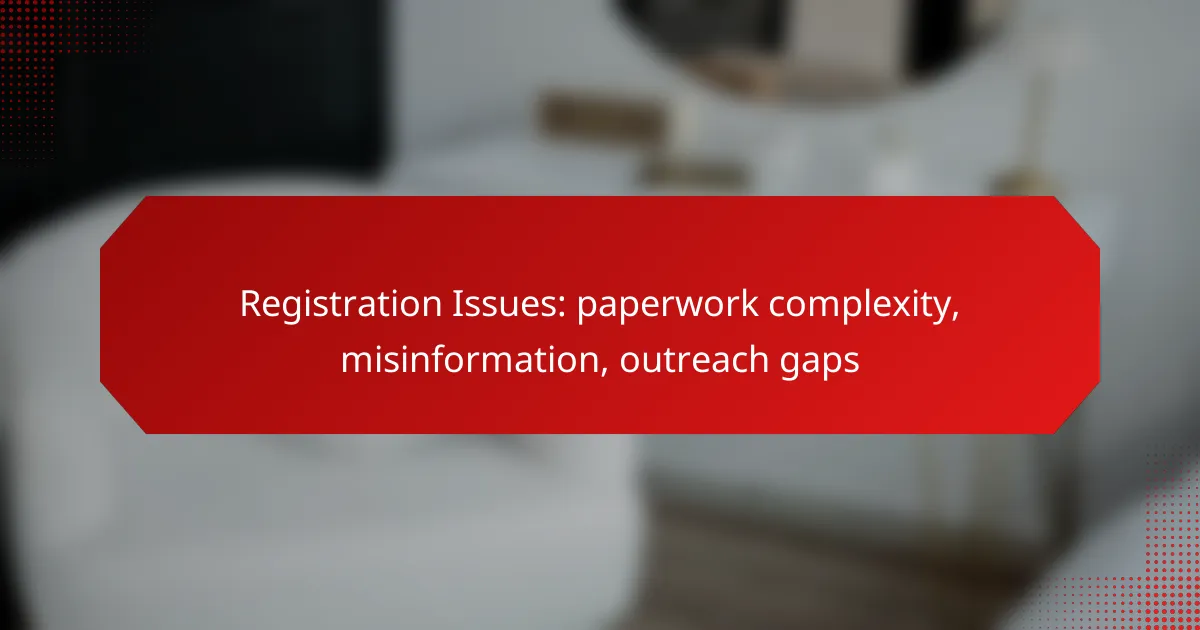Registration issues in the United States often stem from the complexity of paperwork, misinformation from unreliable sources, and gaps in outreach efforts. These obstacles can prevent individuals from successfully completing essential registration processes for voting, healthcare, and licensing. Addressing these challenges requires a focus on simplifying procedures and ensuring access to accurate information and resources.
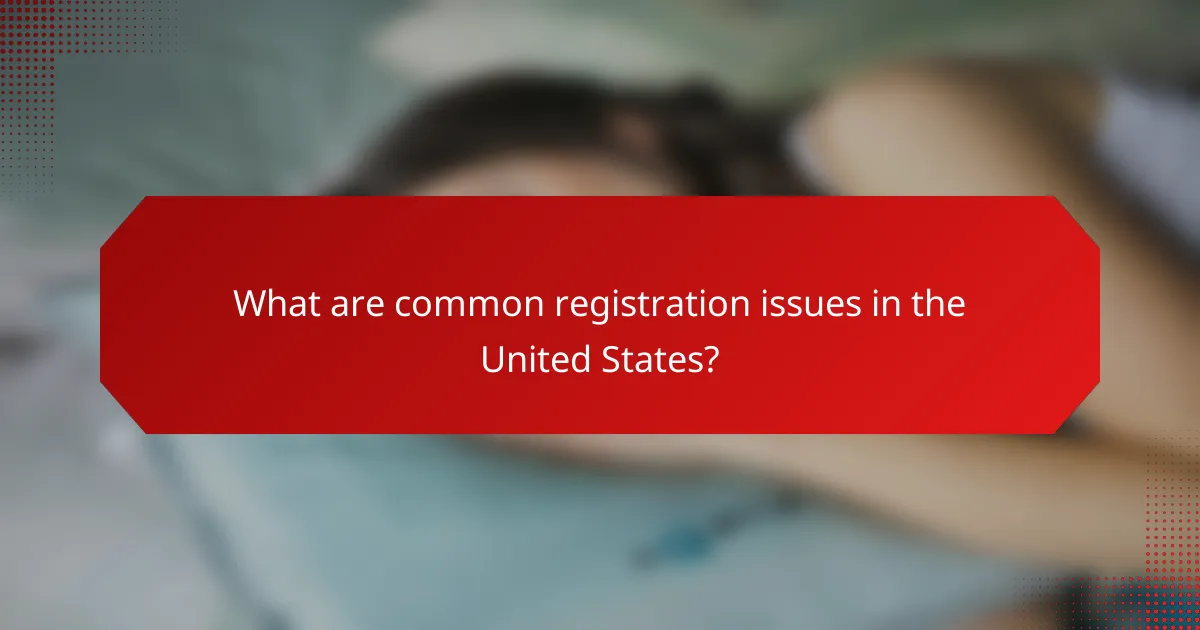
What are common registration issues in the United States?
Common registration issues in the United States include paperwork complexity, misinformation from sources, and outreach gaps in communication. These challenges can hinder individuals from successfully completing the registration process for various services, including voting, healthcare, and licensing.
Paperwork complexity
Paperwork complexity often arises from the numerous forms and documents required for registration. Each state may have different requirements, leading to confusion about what is necessary. For example, registering to vote might require proof of identity, residency, and sometimes even citizenship documentation.
To navigate this complexity, individuals should carefully review the specific requirements for their state or local area. Utilizing online resources or official government websites can provide clarity and help ensure all necessary documents are prepared before submission.
Misinformation from sources
Misinformation can significantly impact the registration process, as incorrect details may lead to delays or rejections. This misinformation often comes from unofficial sources, social media, or outdated websites. For instance, individuals might believe they can register online when their state only allows in-person registration.
To avoid falling victim to misinformation, it is crucial to consult official sources, such as state election offices or government websites. Verifying information through trusted channels can help ensure that individuals follow the correct procedures and meet all requirements.
Outreach gaps in communication
Outreach gaps in communication can prevent individuals from receiving important information about registration opportunities. Certain communities, especially those with language barriers or low internet access, may not be adequately informed about registration deadlines or processes.
To address these gaps, local organizations and government agencies should enhance outreach efforts by providing multilingual resources and utilizing various communication channels, such as community events or local media. Engaging with community leaders can also help spread awareness and ensure that all individuals have access to the necessary registration information.

How to simplify registration paperwork?
Simplifying registration paperwork involves streamlining the process and reducing complexity through effective tools and expert guidance. By leveraging technology and consulting professionals, you can navigate the requirements more efficiently.
Utilize online registration tools
Online registration tools can significantly reduce the complexity of paperwork by providing user-friendly interfaces and automated processes. Many platforms allow you to fill out forms digitally, eliminating the need for physical copies and minimizing errors.
When selecting an online tool, consider features like e-signatures, document storage, and compliance with local regulations. Popular options often include government portals or third-party services that cater to specific industries.
Consult with legal experts
Engaging with legal experts can clarify the registration process and ensure compliance with relevant laws. They can help identify necessary documents, deadlines, and potential pitfalls that may arise during registration.
It’s advisable to consult with professionals who specialize in your specific area of registration, whether it’s business incorporation, non-profit formation, or licensing. This targeted advice can save time and prevent costly mistakes in the long run.

What resources are available for accurate information?
Accessing accurate information about registration issues is crucial for navigating paperwork complexity and avoiding misinformation. Various resources, including government websites and nonprofit organizations, provide reliable guidance and support.
Government websites
Government websites are primary sources for accurate information regarding registration processes. They typically offer detailed instructions, required documents, and official forms necessary for compliance. For example, the U.S. Small Business Administration (SBA) provides resources for business registration, while the UK government’s official site outlines steps for registering a company.
When using government websites, ensure you are on the official domain, often ending in .gov or .gov.uk, to avoid misinformation. Regularly check for updates, as regulations and procedures may change frequently.
Nonprofit organizations
Nonprofit organizations often assist individuals and businesses with registration issues by providing free or low-cost resources. These organizations may offer workshops, one-on-one consultations, and informational materials tailored to specific registration needs. For instance, organizations like SCORE in the U.S. provide mentorship and resources for new entrepreneurs.
Engaging with nonprofit organizations can help bridge outreach gaps, especially for underserved communities. Look for local chapters or online resources that focus on your specific registration challenges to maximize support and guidance.
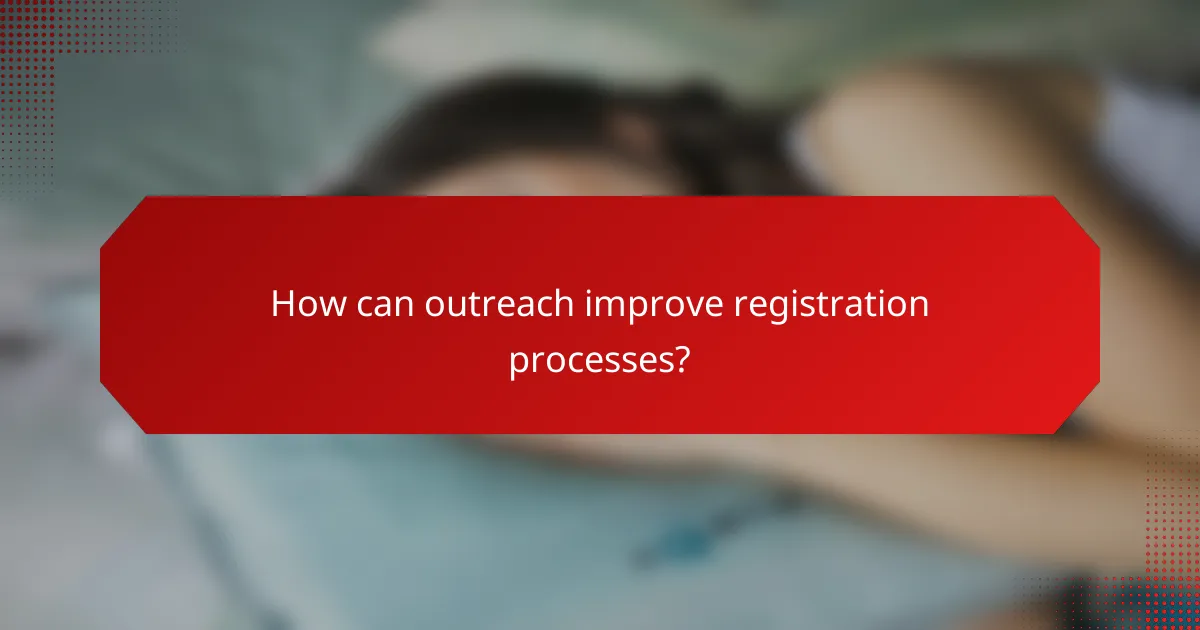
How can outreach improve registration processes?
Outreach can significantly enhance registration processes by providing clear information and support to potential registrants. Effective outreach strategies help bridge gaps in understanding, reduce misinformation, and simplify the paperwork involved in registration.
Community workshops
Community workshops are interactive sessions that educate individuals about the registration process. These workshops can clarify complex paperwork and provide hands-on assistance, allowing participants to ask questions and receive immediate feedback.
Organizing workshops in local community centers or libraries can attract a diverse audience. Consider scheduling these sessions during evenings or weekends to maximize attendance, ensuring accessibility for those with varying work schedules.
Targeted social media campaigns
Targeted social media campaigns can effectively reach specific demographics that may struggle with registration. By using platforms popular among the target audience, such as Facebook or Instagram, organizations can share tailored messages that address common concerns and misinformation.
Utilizing engaging content, such as infographics or short videos, can simplify complex information. It’s crucial to monitor engagement and adjust messaging based on feedback to ensure clarity and relevance, ultimately driving higher registration rates.
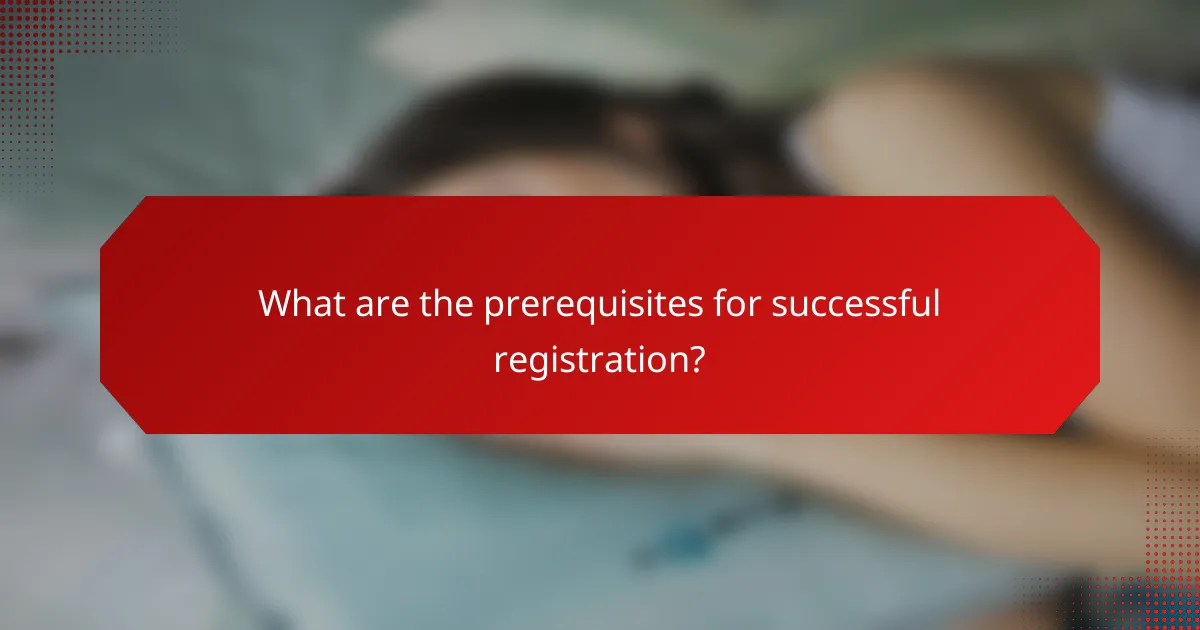
What are the prerequisites for successful registration?
Successful registration requires a clear understanding of local regulations and the collection of necessary documents. Meeting these prerequisites helps streamline the process and reduces the likelihood of delays or rejections.
Understanding local regulations
Local regulations vary significantly by region and can impact the registration process. Familiarizing yourself with the specific laws and requirements in your area can prevent costly mistakes and ensure compliance.
For example, some jurisdictions may require specific forms or fees that differ from neighboring areas. Always check with local authorities or official websites for the most accurate and up-to-date information.
Gathering necessary documents
Collecting the required documents is essential for a smooth registration experience. Commonly needed items include identification, proof of residency, and any relevant licenses or permits.
To avoid delays, create a checklist of documents based on your local requirements. This may include items such as birth certificates, tax identification numbers, or proof of income, depending on the type of registration.
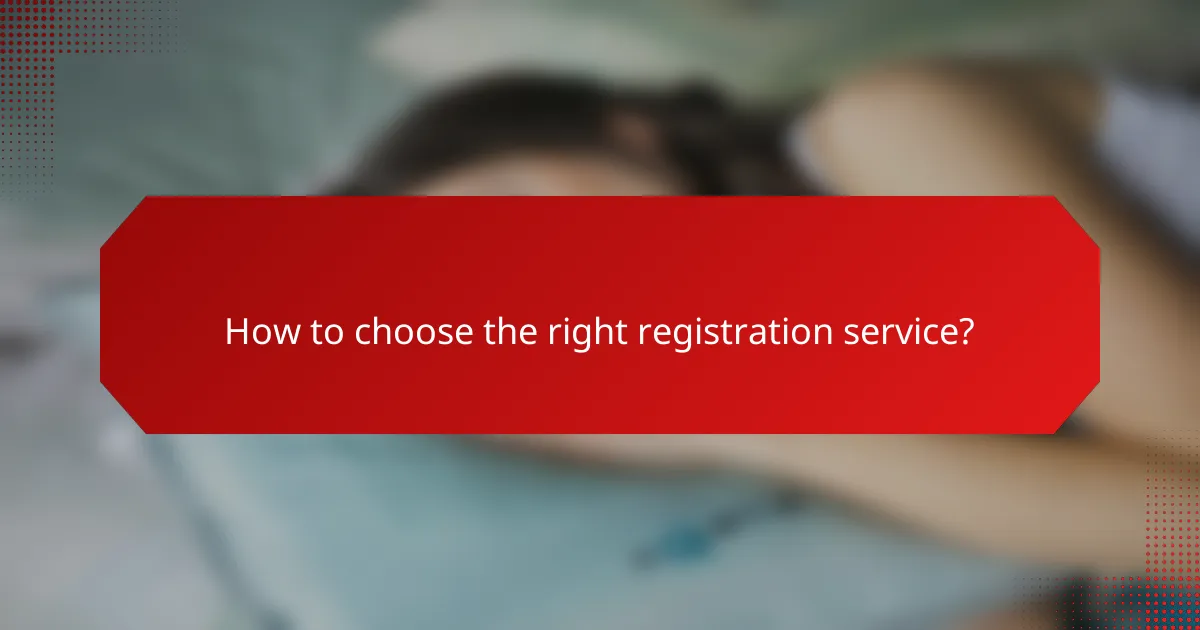
How to choose the right registration service?
Choosing the right registration service involves assessing the quality of the service, its pricing, and how well it meets your specific needs. Look for services that provide clear information, reliable support, and transparent pricing to avoid complications during the registration process.
Compare service reviews
Service reviews are crucial for understanding the experiences of other users. Look for platforms that aggregate reviews, such as Trustpilot or Google Reviews, to get a broad perspective on the service’s reliability and customer support.
Pay attention to the overall rating, but also read individual reviews to identify common issues or praises. Look for comments on responsiveness, clarity of information, and ease of use, as these factors can significantly impact your registration experience.
Evaluate pricing structures
Pricing structures can vary widely among registration services, so it’s essential to compare them carefully. Some services charge a flat fee, while others may have tiered pricing based on the level of service or additional features.
Consider any hidden fees that may not be immediately apparent, such as annual renewal costs or charges for customer support. A good practice is to create a simple comparison table listing the services, their prices, and any included features to help you make an informed decision.
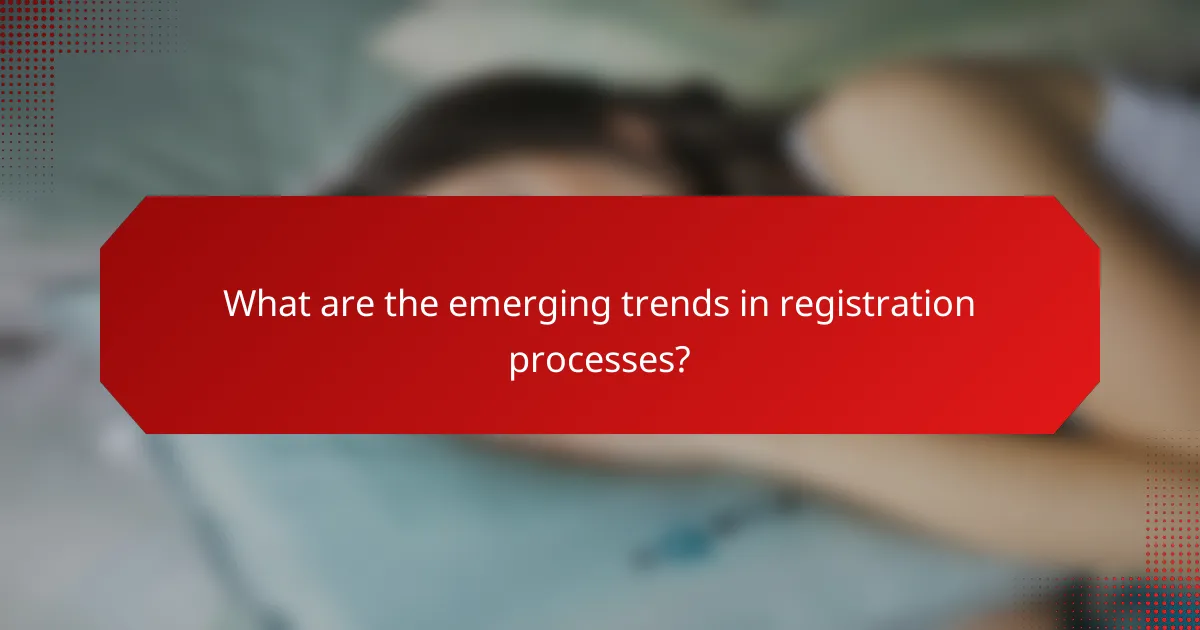
What are the emerging trends in registration processes?
Emerging trends in registration processes include increased digitalization and a stronger focus on user experience. These trends aim to simplify the registration journey, making it more efficient and accessible for users.
Increased digitalization
Digitalization in registration processes involves the use of online platforms and tools to streamline paperwork and reduce manual effort. Many organizations are adopting electronic forms and automated systems to enhance efficiency and minimize errors.
For example, governments and businesses are increasingly offering online registration options, allowing users to complete forms from anywhere, often in just a few minutes. This shift not only saves time but also reduces the need for physical documentation, which can be cumbersome.
Focus on user experience
A focus on user experience in registration processes emphasizes making the experience intuitive and user-friendly. Organizations are investing in user interface design to ensure that forms are easy to navigate and understand.
Key strategies include simplifying language, providing clear instructions, and minimizing the number of required fields. Additionally, offering support through chatbots or customer service can help address user questions in real-time, further enhancing the overall experience.
